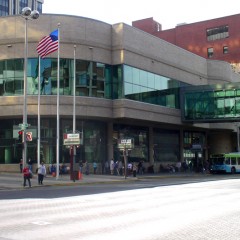
If you read the Spokesman-Review last week, you might have seen the alarming news that Spokane Transit Authority put the much needed remodel of the downtown bus plaza on hold. This was not done because of issues with the design or lack of funding, but because certain organizations that represent monied downtown interests expressed concern about “the behaviors taking place in and around the Plaza.” This follows an article in the Inlander just over a month ago where a few building owners suggested that the space that plaza currently operates in could be put to better use. All the chatter in these articles casts the plaza a magnet for trouble makers, criminals and general loiterers; but that masks what this is really all about: a continued war on the poor.
The perception that the plaza contributes to criminality downtown gained plenty of traction in the wake of a recent murder. No one can be blamed for looking at an incident like that and questioning their own safety in the same environment, but it is often the case that perception strays from reality. The street kids and Spokane Police Department regulars have been a problem longer than I have been alive. Both the Chase Youth Commission and Crosswalk Teen Shelter were founded almost three decades ago due to concerns about people who were simply known as the Howard Street kids. In the early to mid-90’s, First Avenue became the epicenter of crime in downtown Spokane. Regular patrons of the Dead End tavern or Coach House frequently witnessed brazen crack dealers pushing their product, prostitutes working the sidewalk in front of the Jefferson Hotel and shootings and fights in the early morning hours. All of this took place years before a plaza. Despite the intense focus on crime in downtown today, neighborhoods like Nevada-Lidgerwood and West Central have bigger problems than our urban core in practically every category. As a matter of fact, downtown does not lead in any crime category tracked by the Spokane Police Department in their Compstat reports. That is why protestations that the plaza is a problem magnet seem so far fetched.
What the opposition seems to boil down to is the confrontation between affluence and poverty. According to a survey done by Spokane Transit Authority in 2013, 57 percent of their ridership had an annual income of $20,000 or less. The poor have come to rely more on public transportation as a means of mobility than ever before. It was not always this way. With advent of the street car industry in the early twentieth century, public transportation was once used by a broad array of people: upper class city dwellers, middle class professionals and the working poor. As cities sprawled into suburbs however, car ownership became crucial for middle and upper class families living outside the city. The shift to mass automobile ownership has resulted in a transportation system that is nothing short of segregated: wealthier and whiter drivers on one side of the divide and more diverse, low income bus riders on the other side. Couple that dynamic with the desire of business owners and developers to turn downtown Spokane into a more upscale retail center and perhaps it is not a surprise that the plaza has always been a source of contention, but it is no less disturbing.










Hi Blaine,
Frustration with the STA Plaza’s current location does not represent a war on the poor. It is simply a collision between two realities. Two prominent realities exist in America. One is of those who dream to have the money for high stakes banking deals, high end dining, entertainment, hotel stays, and spa treatments. The other reality is of those who have means to actually live this dream. The Plaza, unfortunately, brings these two realities into constant collision. If Spokane continues to grow its banking, retail, and tourist developments in the center of downtown, this controversy will only continue to fester with the Plaza at its current location. A compassionate community would see the human consequences of such a location and nudge it east four blocks (still downtown) to the perfect location of the Intermodal Center.